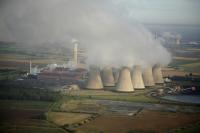The report by the Centre for Policies Studies says proven new technologies can reduce the environmental impact of coal-fired generation. If coal were developed using the new technologies, it said, it could mean a more reliable energy source and cheaper electricity for consumers.
The report, released in advance of the UK energy white paper expected this month , suggested developing clean coal in UK would not only be good for the domestic market, but also an effective way of setting an example for developing economies, including China and India, so they could “take advantage of their own coal reserves” in an environmentally acceptable way.
But in order to make best use of coal, there needs to be clear political support to encourage investors and systematic planning rules for coal sites, said the think-tank.
Subscribe to our newsletter
Stay up to date with DeSmog news and alerts







